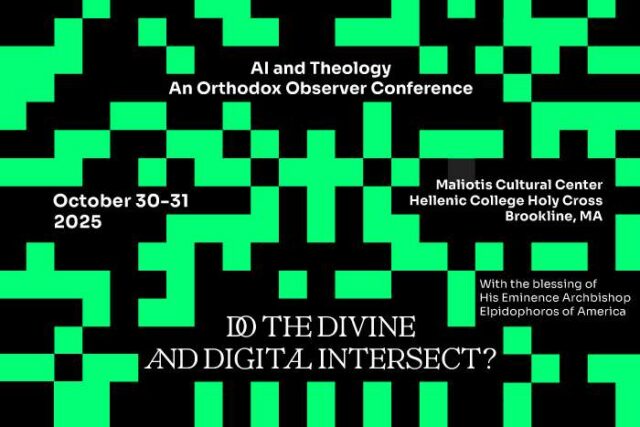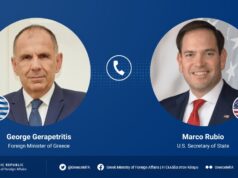WASHINGTON, DC – by Petros Kasfikis, TO VIMA –
The advance of artificial intelligence has raised hopes of boundless progress and fears of machines remaking society on their own terms. What is often missing is a serious discussion of the human soul.
Yiannis Papakonstantinou, a senior engineer at Google Cloud and a member of the company’s top technical leadership, refuses to treat spirituality as an outdated concern. In his view, technology is moving humanity into a new era in which the deepest religious ideas will be tested rather than discarded.
This week, on October 30 and 31, he will speak at Hellenic College Holy Cross in Boston at a conference organized by the Greek Orthodox Archdiocese of America. The event will examine how the divine can coexist with intelligence created by humans. Also attending is Michael Kratsios, the Greek American head of the United States White House Office of Science and Technology Policy.
In an interview with To Vima, Papakonstantinou challenged a widespread assumption that innovation drives people away from God. He insists the opposite is true. The Orthodox faith, he said, is oriented toward the future. It remembers not only where humanity has come from but what it is called to become. He believes the Church is uniquely prepared to guide a world where artificial intelligence may one day think and act beyond human comprehension.
For ten thousand years, humanity has lived with the certainty that we are the most intelligent and the only conscious beings in this world. That assumption may not survive the coming century. As machines gain agency, we will need a new understanding of what separates the creature from the creation and what it means to reflect the divine.
The economic disruption already underway is a warning. Papakonstantinou anticipates that machines will take over most current jobs over the next decades. Wealth will grow while millions of people lose the work that once defined their place in society. He sees this shift not as a threat but as a revelation. If abundance becomes a source of anxiety, he said, that shows a failure of politics rather than a flaw in technology.
A society worthy of the future must value the person above the profession. Today, work has become the dominant measure of human worth. That standard will no longer hold. Families, friendship, contemplation, creativity, and spiritual life have always held equal dignity. They have simply been overshadowed by the economy.
This is where he insists faith cannot remain silent. Questions of purpose, identity, and moral responsibility cannot be answered by engineers alone. A new social contract will require theologians and philosophers alongside lawmakers and scientists. The change is not distant. It will shape the lives of today’s children and certainly those of the generation that follows.
Papakonstantinou also considers the theological consequences of creating minds that surpass our own. In Christianity, the idea that humans bear the image of God has shaped our understanding of consciousness. If humans create minds that surpass their own, he said, they will have introduced into creation a higher form of thought. That possibility calls for humility as well as vigilance.
Present systems are powerful but narrow. Without moral instruction they can cause harm. Papakonstantinou supports what researchers call alignment, the effort to embed human values directly into artificial intelligence. He describes humanity as the parent of a new intelligence with a duty to raise it ethically.
The urgency, he warns, lies in timing. If artificial intelligence develops slowly, society will have prepared early. That would be a modest error. If it advances rapidly, unready institutions could face irreversible change. He does not see enough readiness now.
Papakonstantinou’s message is not fear. It is an appeal to moral imagination. The decisions made now will determine whether future intelligence amplifies human dignity or replaces it with something far less humane. Faith, he believes, is not an obstacle to this work. It is a guide. Technology may transform what people do. It will not change what they are.
Petros Kasfikis is an accredited correspondent covering the White House, State Department, and Capitol Hill for MEGA TV and newspaper To Vima. For the latest political developments from Washington, D.C., you can subscribe to his YouTube channel: youtube.com/c/PKas?sub_confirmation=1





